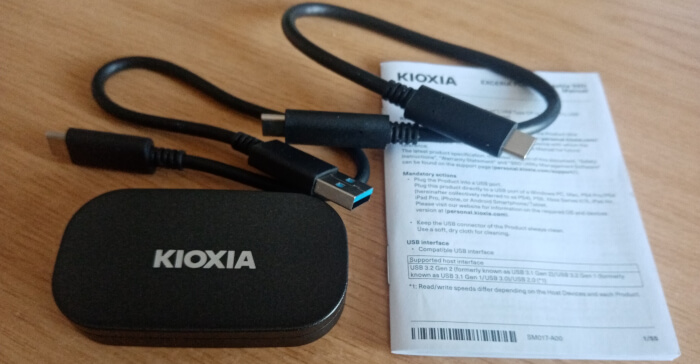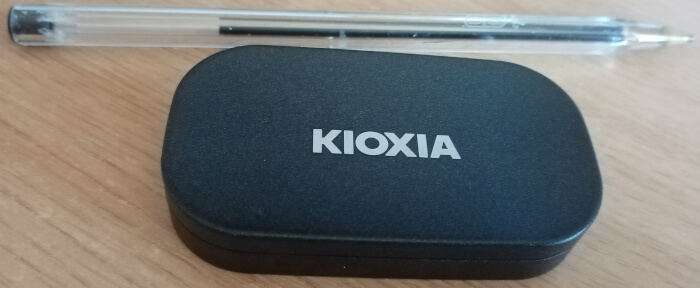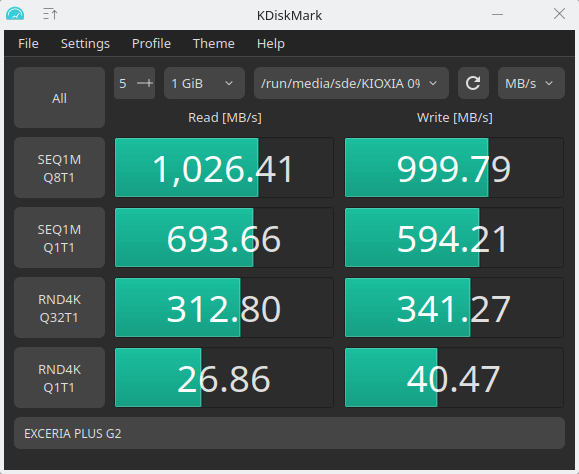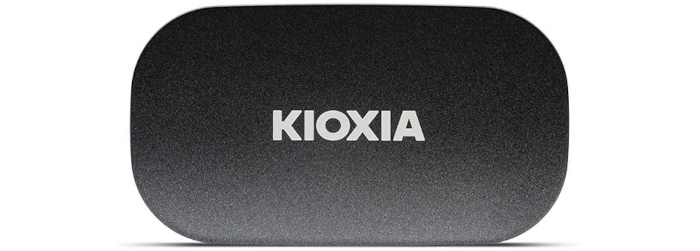KIOXIA is a global leader in flash memory and solid state drives.
For this review, I’ve evaluating the Kioxia Exceria Plus G2 Portable SSD. It’s available in 500GB, 1TB, and 2TB capacities. I’m reviewing the 2TB version.
Modern computers will often include USB 3.0 ports as USB A and USB C connectors. USB 3.0 still offers good enough speed for almost all consumer uses except extremely fast flash based external data transfers.
The device has a maximum sequential read speed of 1,050 MB/s, and a slighter slower maximum sequential write speed of 1,000 MB/s. To achieve these speeds, the host device needs to support USB 3.2 Gen 2 and the UASP mode must be enabled. Fortunately USB 3.2 Gen 2 ports are fairly common unlike Gen 2×2 ports. My NAS devices, desktop PC and mini PC have USB 3.2 Gen 2, so I was able to test the portable SSD on a variety of different machines with different Linux distributions.
What’s in the Box
Kioxia Portable SSD
USB-C to USB-A cable
USB-C to USB-C cable
Instruction Manual

It’s handy that both Type-C to A and Type-C to C cables are provided. Using a USB-A cable doesn’t stop you achieving maximum performance either providing the host’s USB-A port supports the SuperSpeed+ mode.
Design
The design of the portable SSD is impressive with its rounded aluminum housing. It’s easy to hold, extremely lightweight weighing 42g, and diminutive measuring a mere 72.0 x 40.0 x 11.8 mm. It’s dwarfed by an old biro.

Traditionally, 2D planar flash uses a polycrystalline floating gate that is quite thick by today’s standards. This SSD, however, is built with BiCS FLASH and a vertically stacked cell structure .BiCS FLASH 3D flash memory uses a silicon-nitride isolator technology that is thinner and less sensitive to degradation effects. The three-dimensional nature of BiCS Flash helps improve performance, reduce heat dissipation and lower costs.
Performance
The drive comes formatted with the exFAT, or Extended File Allocation Table. That’s a file system developed by Microsoft, primarily designed for flash memory like USB drives and SD cards file system. I reformatted the SSD to use ext4.
For basic speed tests, I used KDiskMark, a free and open source HDD and SSD benchmark tool with a very friendly graphical user interface.
KDiskMark with its presets and powerful GUI calls Flexible I/O Tester (fio) and handles the output to provide an easy to view and interpret comprehensive benchmark result. Here’s the output from KDiskMark with the portable SSD.

Most SSD manufacturers quote the max sequential read and write with the Q8T1. As you can see, the Kioxia portable drive comes extremely close to the manufacturer’s quoted maximum speeds.
In practice, my testing registered reads of between 970 MB/s and 1,020 MB/s as well as writes between 960 MB/s and 1,000 MB/s depending on the workload.
I also hammered the drive with huge file copies including 400 GB transfers. It continues to maintain the high disk write speed unlike many other portable SSDs which reduce in speed once the cache is exhausted. Its aluminum housing offers effective heat dissipation. The SSD gets only slightly warm under really heavy workloads which bodes well for longevity.
Summary
The best SSD should strike a balance between speed, capacity, and price. Your own personal preferences will dictate which of them is the most important to you. When evaluating a portable SSD, I consider read/write speeds, connectivity, and the overall design including build quality to be crucial factors.
The Exceria SSD lives up to the manufacturers claims in terms of speed. For a USB 3.2 Gen 2, it performs admirably both in terms of large reads and writes, as well as sustained writing. The 2TB size is a good size too. But what really makes the difference is value for money. For a 2TB drive the price is competitive (the previous version is available for £84.99). Visit KIOXIA’s Amazon page, and the specific product page here. These are not affiliate links.
The manufacturer says the device is compatible with Windows OS, macOS, iPadOS, Android OS, PS4, PS4 Pro, PS5, Xbox Series X/S. There’s no explicit mention for Linux support, but rest assured the device works flawlessly with all the Linux distributions I tested it with including Ubuntu, Manjaro, Mint, and Fedora.
To wrap up, if you’re looking for an affordable SSD for under £100, the 2TB Kioxia Exceria Plus is an excellent option that also benefits from a great design. It’s an extremely slimline, portable and durable SSD which will appeal to videographers, photographers and others who work with visuals very often. I’d prefer a cover on the port though.

